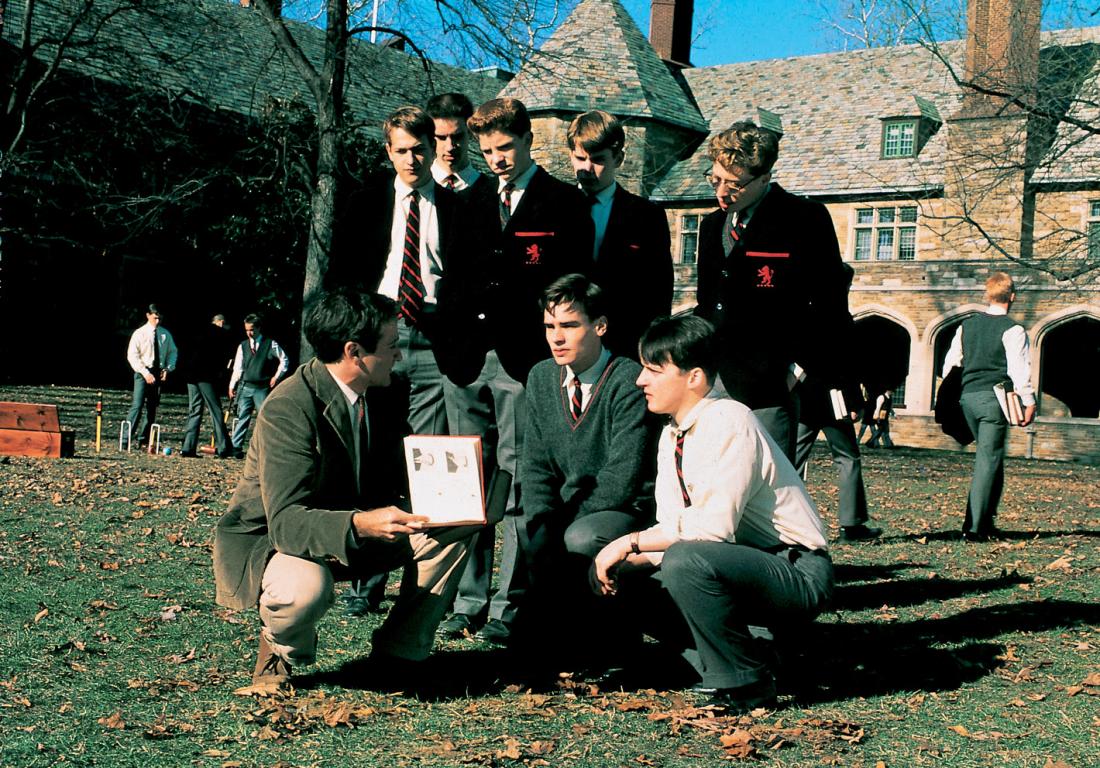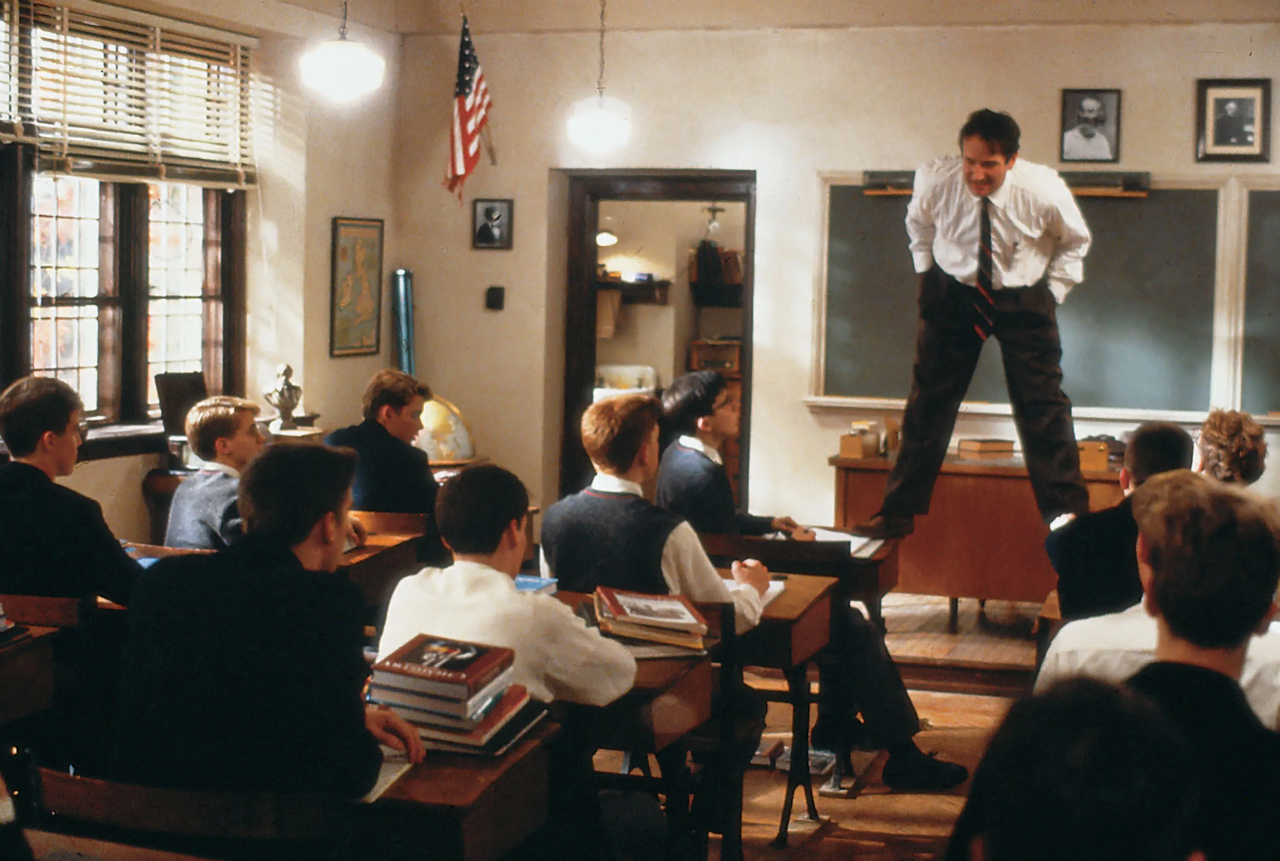Through delicately arranged verses and margins, poetry offers timeless empathy and profound solace. 36 years ago, the film Dead Poets Society spoke to the hearts of those who had long conceded to society’s rules, rekindling a new sense of aspiration. This May, join the Sungkyun Times (SKT) to take a glimpse at its heartwarming storyline and surrender to the film’s poetic inspiration.
Oh Captain, My Captain
-Masterpiece Recited
Premiered in 1989, the renowned film Dead Poets Society was directed by Peter Weir, also known for his 1998 sensation, The Truman Show. This coming-of-age drama film set in an all-boys boarding school is set in 1959, where it explores a group of young students’ compelling narratives and pragmatic lives. The outstanding performances of actors Robin Williams as John Keating and Ethan Hawke as Todd Anderson further immerse the viewers, subtly embodying the complex emotions of their characters. Grossing $235 million worldwide, the movie was critically acclaimed, winning the Best Film at the 43rd British Academy of Film and Television Arts (BAFTA) Awards and the Best Original Screenplay at the 62nd Academy Awards, among others. Undeniably striking, Dead Poets Society continues to evoke diverse thoughts, remaining a celebrated masterpiece to this day.
-Synopsis (*Spoiler Alert)

John Keating, a former student at Welton Academy, returns to this prestigious institution as an English teacher. Founded on traditional values, this establishment expects its students to demonstrate unwavering discipline at all times. However, Keating’s unconventional philosophies inspire them to break the mold, encouraging them to find their true selves and appreciate the beauty of life. Despite the school representatives’ strong disapproval of this unorthodox attitude, fueled by his passion, some Welton students even revive the Dead Poets Society, an underground poetry club dedicated to discovering the true meaning of life in which Keating himself had once partaken. As the unyielding system collides with the students’ newfound ideals, the world they once knew soon begins to fall apart...
Mere Ideals, Bare Reality
-Seize the Day!
Throughout the film, Keating conveys the spirit of carpe diem, meaning “seize the day,” to Welton students in various ways. Initially, he challenges them to think for themselves, urging them to escape the constraints of orthodoxy.

He adopts a strange method to deliver this message; he instructs his students to rip out pages from the textbook when it presents a mathematical rather than a literary approach to analyzing poetry. Gradually, the students accept this unprecedented approach and break free from the rigid ideas along with the torn pages. Beyond this, Keating encourages his students to live an autonomous life, unshackled by the expectations of others, including their own overbearing parents. In one of his classes, he takes the boys outdoors, making them walk in their own unique footsteps, uninfluenced by the pace of others. Finally, he motivates them to question their deepest aspirations, which eventually ignites the revival of the Dead Poets Society. Throughout this process, Keating places a special emphasis on the role of poetry in human existence, reciting, “And medicine, law, business, engineering — these are noble pursuits and necessary to sustain life. But poetry, beauty, romance, love — these are what we stay alive for.”
-In the Name of Carpe Diem
As the film progresses, the Welton students appear to overlook the responsibility that comes with seizing the day, making impulsive and immature decisions that conflict with Keating’s teachings. For example, even after realizing that the girl he had fallen for has a boyfriend, Knox, an overeager teenager, goes for a kiss anyway in the name of carpe diem. In another instance, Charlie, a bold and rebellious student, challenges the rigid rules of Welton Academy in an improper manner and gets himself into trouble. Although Keating seeks to teach them that one must be wise, distinguishing between the “time for daring and time for caution,” his students are too naive to grasp this notion. It is only at the film’s final moments that the weight of his lessons hits them. As Keating is forced to leave the classroom due to a false accusation surrounding a student’s death, his students stand up on their desks to show him deep respect and mourn their helplessness. This scene is especially remarkable as Todd, an initially timid and insecure student, courageously takes the first step, finally learning to speak for himself and find his voice.
The Powerful Play Goes On
The uplifting story of Dead Poets Society remains deeply relevant today. Although it sought to challenge the status quo, after all these years, reality remains essentially unchanged. Education is still bound to traditional and standardized values and the voices of the young too often remain suppressed. This is perhaps the very reason why the film still resonates so strongly across generations, speaking to hearts that yearn for a spark of motivation. For anyone feeling stagnant in the face of change or struggling to confront their inner aspirations, the film makes a powerful call to action, offering a much needed push to pursue their dreams. Ultimately, it affirms the discouraged that “the powerful play goes on, and you may contribute a verse,” inviting everyone to leave their own trace of existence in this beautiful ongoing journey called life.
Words have power, and poetry carries resonance — it knocks on hearts, fuels souls, and opens minds. Without such inducement, it would take great courage even to dare to change. For Kingos who have lost motivation or are seeking a little spark, why not immerse oneself in the beauty of poetry and join the Dead Poets Society on an adventure to discover the true essence of life?
